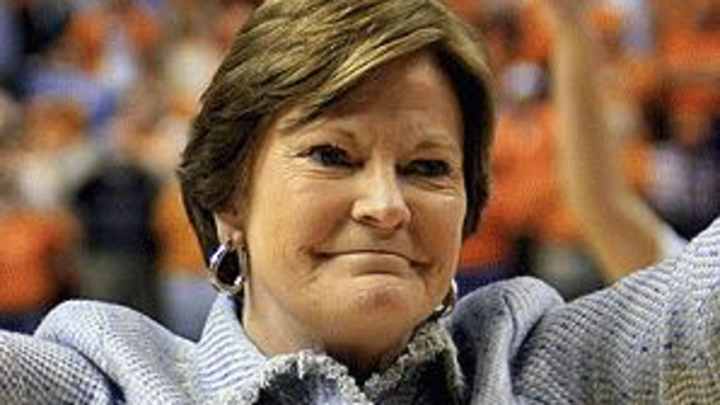Pat Summitt diagnosed with dementia, plans to coach this year

"I plan to continue to be your coach," Summitt said in a two-minute video statement released by the school's athletic department.
The iconic coach -- who turned 59 last June 14 -- said at the conclusion of last season she consulted with her local physicians after experiencing what she told The Knoxville News Sentinel as months of erratic behavior and memory lapses. Her physicians advised her to visit the Mayo Clinic in Rochester, Minn., in May, where she underwent a series of tests.
Then came the diagnosis.
"Earlier this year the doctors at the Mayo clinic diagnosed me with an early onset dementia -- Alzheimer's type," Summit said.
The news of Summitt's diagnosis rocked the women's basketball community. UConn coach Geno Auriemma, who has famously battled with Summitt, over the years, released a statement of support. "I was shocked and saddened to hear about the news regarding Pat Summitt's diagnosis," said Auriemma, who is two years younger than Summitt. "You don't necessarily associate dementia with people our age so this announcement really put things in perspective. Pat has great support from her family, friends and staff and I know they will help her immensely. There is no doubt in my mind that Pat will take on this challenge as she has all others during her Hall of Fame career -- head on. I wish her all the best."
Said Oklahoma head coach Sherri Coale: "I think it's important to remember that while Pat is a basketball coach, the architect of one of the most storied programs in the history of our sport, she is also a mother, and she's a daughter, and she's a friend. She's a person who life is happening to. It takes great, great courage to fight health issues; it takes even greater courage to fight them in front of the world. Pat's willingness to share this private battle speaks volumes about her strength and her character. She's modeled tenacity and endurance and optimism and faith for generations of athletes on the court. I know those athletes, we coaches, women's basketball fans, and sports fans in general will join in returning those gifts to her during this time of need. "
Speaking from her home in Blount County, Tenn., with her dog Sadie sleeping on her lap, Summitt said she would not stop coaching. "I plan to continue to be your coach," Summit said. "For that reason I will be relying on my outstanding coaching staff like never before. We have always collaborated on every facet of Lady Vol Basketball; and now you will see [assistants] Holly Warlick, Mickie DeMoss and Dean Lockwood taking on more responsibility as their duties will change significantly. I love being your coach and the privilege to go to work every day with our outstanding Lady Vol student athletes."
The UT athletic department confirmed to SI.com that Summitt told her players about her early onset dementia in a team meeting on Tuesday. " Obviously, I realize I may have some limitations with this condition since there will be some good days and some bad days," Summitt said in letter posted on the university's website.
Summitt told The News Sentinel that she often felt low at times last season and second guessed some of her decisions. "There were some mornings I would wake up and think I don't even want to go in," Summitt said. "That didn't last long but it was like 'What's wrong with me? What's going on with me?' She told The Washington Post that "sometimes I draw blanks."
Her son, Tyler, a junior at Tennessee and a walk-on on the men's basketball team, told The News Sentinel, "Nobody accepts this. And there was anger. 'Why me?' was a question she asked more than once. But then, once she came to terms with it, she treated it like every other challenge she ever had, and is going to do everything she possibly can to keep her mind right and stay the coach."
Summitt said that she didn't consider retirement. She told The News Sentinel that she was encouraged after speaking with Dr. Ronald Petersen, the director of the Mayo Clinic's Alzheimer's Disease Research Center. "He's the one who told me you can coach as long as you want to coach and no one else had said anything like that to me,'' Summitt told the newspaper. "I haven't talked to him [lately] and I even thought about calling him sometime soon and telling him where I am with this. He was so positive [saying] 'You can work through this.'"
The paper reported that Summitt has formulated a plan that involves mental activities, such as reading and doing puzzles at night before going to sleep. Summitt told The News Sentinel that her maternal grandmother had suffered from severe dementia.
One of the icons of women's basketball, Summitt has led UT to eight national championships and 1,071 career victories, the all-time winningest coach in NCAA basketball history, regardless of gender. This will be her 38th season coaching at the university. Summitt said she does not plan on speaking about her condition in the immediate days ahead.
"I've been honest and shared my health concerns with you and now we'll move forward to the business at hand -- coaching a great group of Lady Vols," she said. "For the time being, I hope you will respect my privacy regarding this matter."
